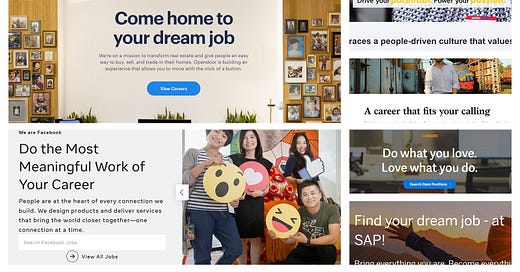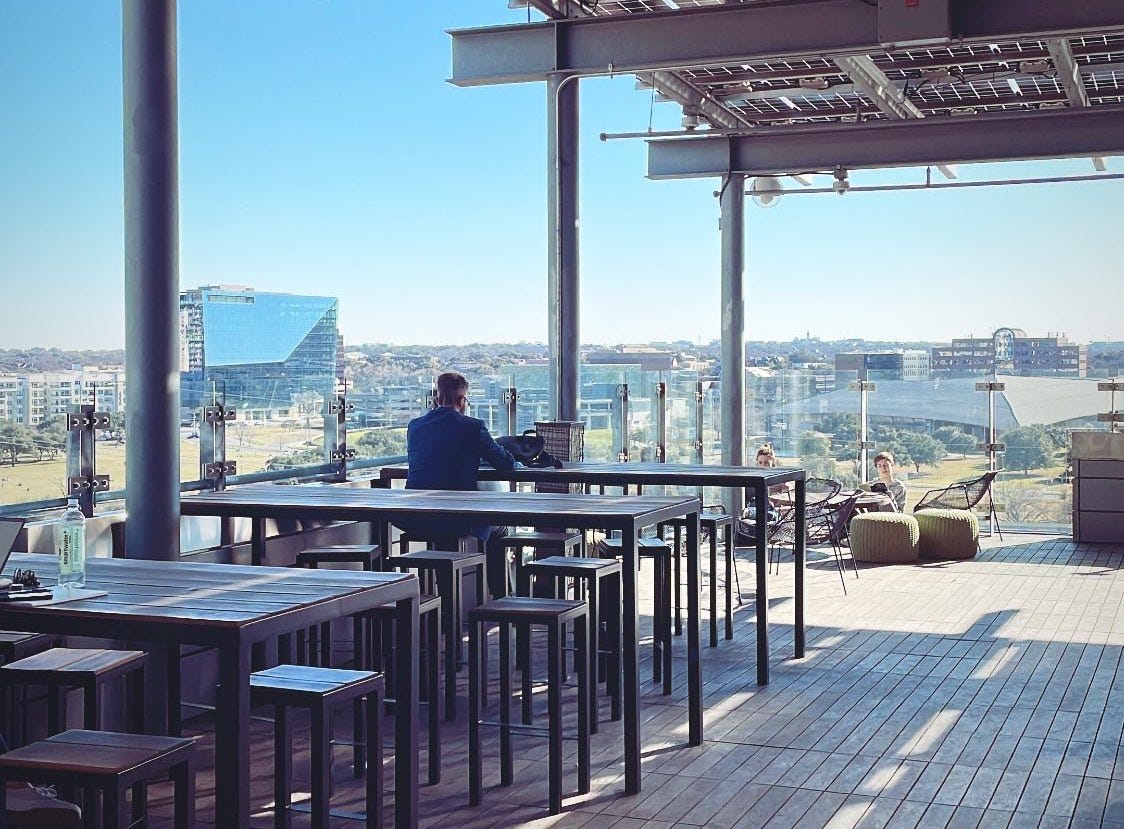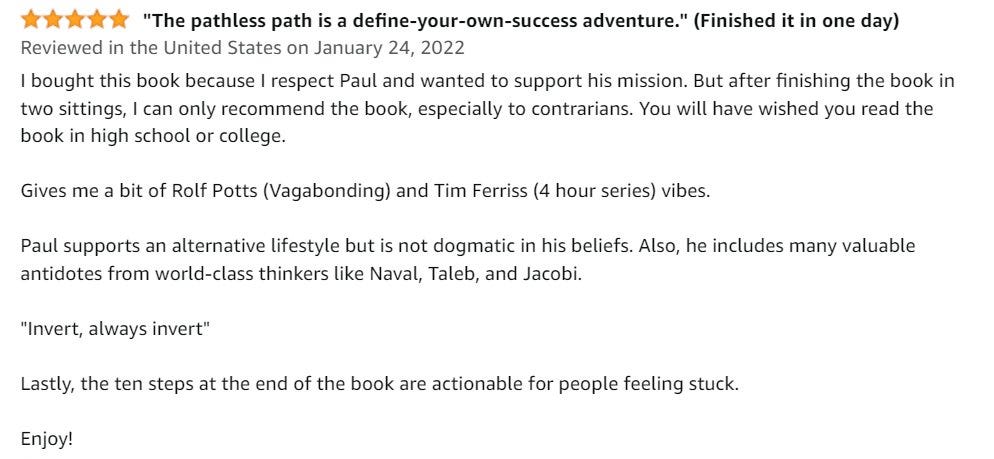January 29th, 2022: Greetings from Austin. I did a ton of writing this week and had a few live sessions with some of the corporate cohort-based courses I’m running with clients in the UK and Dubai. I visited the Austin public library this week which is by far the coolest I’ve seen in the US (apparently inspired by the Copenhagen and Amsterdam ones)
This week I wrote about what might come after “meaningful work” and also offer a short update on my book sales.
👉 First, two things I wrote this week before diving in
A 4,000-word annual review on 2021, my book, my finances, and what’s next
A Twitter thread I did breaking down how much money my various activities made in 2021
#1 What’s After Meaningful Work?
Most of us relate to working through a meta-narrative. We typically inherit these meta-narratives from our parents but then are especially influenced by the culture in school and then through young adulthood.
In the first few years after graduating college in 2007, a new idea went viral and was injected into the center of many people’s meta-narratives for work. It was the idea of “meaningful work.”
It’s better to call this “modern meaningful work” because it wasn’t your grandfather’s “meaningful work.” Instead of the protestant idea of a “calling,” something that was tamed by religious virtues, it was something that people, especially millennials, elevated to one of the prime aims of their life. Find a dream job filled with bounties of meaningful work and then all would be figured out.
The current version of “modern meaningful work” is almost completely aligned with full-time work but it existed around the edges of mainstream culture for much longer. Likely a product of the high-potential / California / spiritual movements of the 60s and 70s, the idea that you needed to “offer your gifts” to the world finally snuck in and exploded into the mainstream through startups in the early 2010s. As those companies went on to literally take over the economy, the ideas about work shifted radically too.
I would love to claim that I was immune but that would be a lie. I spent about two and a half more years than necessary in the workforce pulled forward by the belief that a dream was just around the corner.
Yet today this idea has become so mainstream that people are starting to lose faith. Look no further than even the most rigid corporation’s career page and you will find bold promises of “dream jobs,” “meaningful work,” and “love what you do” to anyone who will listen.
The modern meaningful work ethic is pretty simple. There are three basic assumptions.
Jobs that provide meaningful work exist
They are worth searching for and optimizing a career around
Once you find them, everything will be great
If you are sensing that I might think there are some gaps in this ethic, you would be right…
The Pandemic Killed Modern Meaningful Work
Modern meaningful work is no longer a working story.
It’s not that people aren’t still pursuing dream jobs or chasing jobs with elusive “meaningful work,” it's that far too many people have softened their attachment to work as one of the prime aims of their life.
If I had to pick a moment when the common knowledge about the usefulness of this script started to fall apart, it was probably a few months into the pandemic.
The pandemic awoke many people from inertia-driven existences. Ones that weren’t so bad but weren’t really getting better either. They were just certain paths people happened to be on. Forced out of ritualistic office commutes and working from various places in the home, surrounded by people who definitely mattered more than coworkers, people all around the world started asking questions. Not simple questions but ones about parenting, where to live, schooling, dreams, success, money, and of course, the role of work in our lives.
Before the pandemic, I had been having curiosity conversations for more than three years. The typical person that booked a call with me was one inclined towards unconventional paths. They were already well on their way towards remixing their path and simply wanted to learn from me or potentially become friends.
By April 2020, the types of people that reached out shifted. They were my old friends, the kind of people who were not only successful on traditional paths but liked the paths they had been on too. They didn’t have the desperation to escape as I did. Yet they were suddenly feeling lost and wanted help figuring out what had gone wrong:
“What is going on?” “Why does work feel so weird?” “How did I not notice how much time I spent away from my family?” “Where do I start if I want to make a change?”
As the pandemic went on some people started coming up with answers to these questions and started to blow up their lives. I’m still surprised at the people who ended up doing this - they weren’t the people I expected. Some people moved across the country, some went nomadic, others quit without a plan. New kinds of people were looking to shake up their relationship to work, not just the unconventional panthers I had gotten to know on the first few years of my self-employment journey.
At the same time, many people chose to muddle through and these people are the most interesting. Because if you just look at their situation they are still employed, firmly on their paths. But if you compare how they are orienting their lives around work and the beliefs they attach to the role of work in life, there has been a big shift. I’m not sure what will come of this, but every time a return to “normal” is delayed, the more people abandon their faith that meaningful work is one of the most important anchors for how they think about their career.
The Problem: We Don’t Really Have a Replacement
Like many things, we seem to be in a time between worlds. No longer stuck with the story of the industrial office but not quite remote and optimizing our lives around an established new normal. Some people are experimenting around the edges, but no clear path, way of structuring your life, or story for how we should think about work has emerged.
While I did propose a “new story” in my book, it’s really a choose-your-own-adventure sort of story rather than a bold new vision for society. While I could have landed more speaking engagements with big companies if I had taken a stand on a bold, clear framework for a new future for the future of work, that didn’t really excite me.
I’ll leave the bold visions to the media organizations. Oh wait, no - they seem to be stuck in a weird debate right now over the inequities between office workers and remote workers - based on the assumption that one can only get ahead by showing up to an office. I don’t think this is worth spending any more words on here, it just shows they don’t know what’s up either.
The reality is that no one knows what the future of work looks like. Yet it wouldn’t be very fun to end the piece here so I want to leave you with some clues I’ve found about what’s next in the past couple of years. These are from conversions with a wide range of individuals around the world, experiments I’ve seen people make, and different communities I’ve engaged in both virtually and online.
Some of these might be selection bias - I tend to chat a lot with people already on unconventional paths - but I think a few of these might grow into broader trends, especially in Gen Z.
Real experimentation with fractional work, something really only seen at the lowest end of the labor market with MTurk but now part of “bounty” work in DAOs
Much more experimentation with nomadic living - a surprising number of people have taken at least one month living in other locations. I expect this to continue to grow over time.
The reimagination of the home as an office and more. The home is shifting from a place to sleep and feed people to a place where people live, work, exercise, teach, entertain, and even co-work with friends. People want bigger houses and in places where they actually want to live
Broader acceptance of sabbaticals and extended leave from work to explore some of the harder questions mentioned above. Without meaningful work pulling people forward, there doesn’t seem as much pressure to keep going on a career path non-stop in one’s adulthood
Serious embrace of 4-day workweeks, which is no longer seen as a silly thing to be aiming towards. While a lot of this is still connected to labor movements that don’t really understand the current reality of work, I could see many innovative founders experimenting with different workweek experiments
Reimagination of work from the bottom-up: I’ve talked to a few founders who are really interested in re-thinking how work gets done from a bottom-up perspective. Instead of starting with the status quo and tweaking it (four-hour workweek), they are asking a different question: what’s the best way to get work done? This might involve things like breaking up the year into three-month blocks, eight-week sprints or even designing work around rest, which is what Sean McCabe has done, structuring his company operating rhythm around 7th-week sabbaticals.
I think on the company side, especially as pandemic remote turns into real remote, we will see continued and accelerated experimentation with how work is structured. Similar to how companies tailored their messages to millions in search of “dream jobs” the smartest companies will realize there is a lot of upside in targeting the many post-meaningful work people ready for a new way forward.
#2 Book Update
People seem to be enjoying the transparent book updates so here’s the latest update, organized into a simple dashboard.
This week, I sent out thirty books to Harvard where Valerie Zhang is going to be hosting a book club on campus (or whatever she comes up with), and also sent some around the country and to Canada, the UK, and more. Excited to see where all these books end up.
Sold another 118 books this week and I suspect they may start to slow soon but you never know!
Some fun feedback I received this week:
I am focused on building a life around exploring ideas, connecting and helping people, and writing. If you’d like to support me directly the best way is to consider becoming a paid supporter of the newsletter.
Alternatively, I use and love all of the following services and they give me 30% of all revenues from people that sign up. If you plan on launching a course or e-mail list and you end up using my affiliate code, I’ll gladly spend an hour helping you get set up and answering questions. Just let me know!
Podia - 14-day free trial (read my review here)
Teachable - 14-day free trial
ConvertKit - First 1k subscribers for free
A reminder: I don’t check unsubscribe alerts and never look at my subscriber list. So if you feel like unsubscribing, you can do so below.










